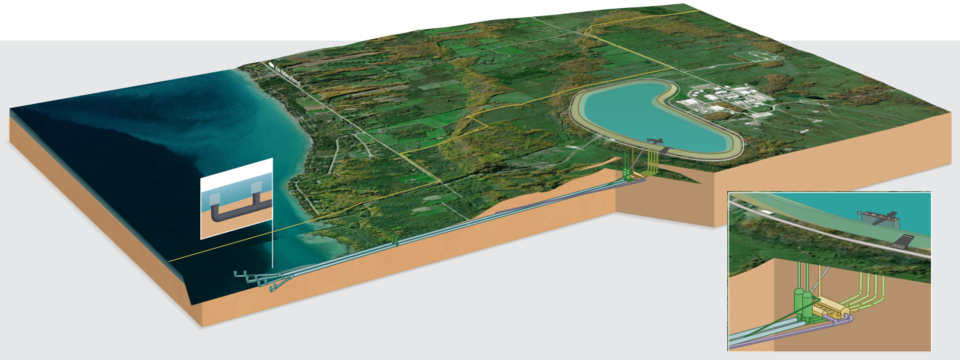The Blue Mountains council has defeated a resolution that would have declared the town’s opposition to the pumped storage energy project proposed for a military base in neighbouring Meaford.
Coun. Paula Hope brought the resolution opposing the project forward for consideration. In a 3-3 vote, the resolution was defeated with Hope and councillors June Porter and Alex Maxwell in favour.
The matter came to the council table towards the end of a long council meeting on July 15. By the time the resolution was on the table, deputy mayor Peter Bordignon had departed the proceedings.
Hope introduced her resolution and said she is concerned about contaminants on the military base property getting into Georgian Bay when the project is under construction.
“Don’t take the risk,” said Hope, as she listed a number of chemicals that have been identified as being on the base property.
“It behooves us to be real stewards of our water,” said Hope. “There’s some pretty serious opportunity, to use that word in an ironic way, for contaminants to be spread into our water.”
The presence of Hope’s resolution on the agenda attracted a large crowd to the council chambers for the meeting. TC Energy representative Clark Little was a delegation at the meeting and made a presentation in support of the proposal.
A number of opponents of the project also spoke to council during the public comment portion of the agenda.
Coun. Shawn McKinlay questioned why council would pass another resolution on the matter and called the resolution “redundant.” McKinlay noted that in December council had supported a resolution opposing the project that had been circulated by the Township of Archipelago.
“Procedurally, why would we make the same motion twice?” he asked.
Coun. Gail Ardiel wondered if council would be jumping the gun by passing a resolution opposing the project for environmental reasons, before the environmental reports and assessments had even been completed. During his delegation, Little told council the various environmental assessments of the project would start until the end of the year at the earliest and would take several years to complete.
“I’m just wondering if this is premature,” said Ardiel. “They are working on the reports and we just have to wait. No, we’re not happy with it, but is it going to change the vote in Meaford or Grey County? I don’t think so. We’re the lone wolves. I just can’t support this right now.”
The opposition expressed by her colleagues appeared to surprise Hope -- the Archipelago resolution had passed unanimously -- who said the quality of local drinking water is “sacrosanct.”
“I find this surprising,” Hope said after hearing the concerns. Hope attempted to withdraw the motion, but this effort was denied by Mayor Andrea Matrosovs, who ruled that the motion had been served, appeared on the agenda and required a vote.
After the meeting, a representative from TC Energy said they are pleased with the results of the vote.
“We are encouraged that council did not support Coun. Hope’s motion of opposition yesterday," said project communications lead Sara Beasley in an email.
"We look forward to continuing to work collaboratively with the Town of The Blue Mountains as we develop the project, and we appreciate the support we have received from municipal councils in Meaford, Owen Sound and Grey County," she wrote. "We believe the Ontario pumped storage project will provide a lasting regional impact through local hiring and local buying, while ensuring protections for Georgian Bay.”
The TC Energy project plans roughly include building a 375-acre reservoir dam, elevated from the shoreline, on the military training base in Meaford. Electric pumps at water level would pull water from the bay with intake pipes far from the shore, and send it up to the reservoir during off-peak hours when demand for electricity is low. Later, when the demand on the grid increases, the water would be released back into the bay by gravity, generating power for the grid.


